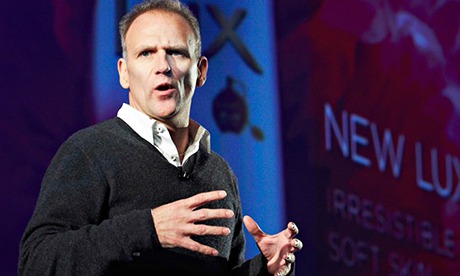
Image from: Unilever
So Tesco has appointed a new CEO. Dave Lewis of Unilever is to head the company from October 1st and he inherits a business in a poor state. In my view he faces four key challenges:
Caught between pillar and post
Tesco’s positioning has suffered in the last few years. Caught between hard discounters like Lidl and Aldi and players like Waitrose who trade on quality, Tesco has struggled to stand for something. It’s neither cheap enough to compete on the one hand, nor is it good enough to cut the mustard on the other. Worse, the retailer’s fixation on price as a differentiator has led it away from some of the elements that made Tesco so compelling to shoppers a decade ago.
In fairness to the outgoing CEO, Phil Clarke, the company was already some way down this track before he took over from Terry Leahy but Clarke has failed to see the writing on the wall: Price is simply not a strong enough platform upon which to build a retail brand.
Tesco’s new CEO will have to draw on his significant experience to re-position this brand. This will be a global challenge for him; it’s clear that shoppers in the US, Japan and China never ‘got’ Tesco as a brand. Without a strongly differentiated position in growth markets like Turkey, Thailand and Malaysia, Tesco will struggle to bounce back.
Global retailer?
Tesco is the world’s second largest retailer (according to Deloitte) but it operates on a limited geographic footprint of only 12 countries. As compared to Walmart and Carrefour who operate in 27 and 34 countries, Tesco is positively parochial. Tesco has had mixed results in its gambles abroad and it’s likely that shareholders will demand better performance from the retailer’s overseas operations in the near future.
Tesco’s new CEO will be expected to have a clear strategy for existing holdings outside the UK. He’ll have to make tough calls whilst fending off disgruntled shareholders who would re-trench the business and realizing opportunities in a world where retail is increasingly global.
Right store format?
There was a time in the mid-noughties when it felt like Tesco was taking over the world (remember this 2006 spoof video?).
Stores were opened at (to some) an alarming rate. Early expansion was driven by large hypermarket style propositions in commercial locations. But shopping habits are changing rapidly. In Asia and Europe observers note that shoppers are increasingly choosing to shop closer to home in smaller outlets or to buy online. The big box of yesteryear looks increasingly outdated and as a result like-for-like sales are falling.
Tesco’s new CEO faces a significant problem here, with large amount of his balance-sheet tied up in property of questionable long-term value he may find that he has insufficient liquidity to revitalize his store portfolio. This presents leaner small-store competitors and online retailers with a major opportunity to snipe at Tesco’s market shares in the medium-term which will compound Lewis’ problems.
The online challenge
The last major challenge facing Tesco’s new CEO is the pace at which shoppers are moving online. Whilst the share of grocery sales made online is still relatively small, it’s easy to see that the tide is turning away from physical stores. Here at least Tesco has a significant global opportunity to plug some of its geographical gaps by introducing pure-play online offers in markets in which they are not yet represented.
At the same time however, Tesco has to manage the stress on existing operations as shoppers leave physical stores. This is a major struggle for all bricks and mortar retailers, regardless of whether or not they can persuade their customers to remain loyal to the brand online. As sales leave the store, stores themselves become less economically productive and asset portfolios deliver lower returns. Larger retailers like Tesco are significantly more vulnerable to this than smaller ones as the spectacular failure of companies like Borders show. Dave Lewis will need to be very light on his feet to avoid a similar fate.
What Tesco’s new CEO will ask of you
For brand owners who depend on Tesco for a significant share of turnover, there may be tough times ahead. There’s no doubt that Mr. Lewis will be busy building a grand plan even as he wraps up his time at Unilever. Tesco’s grand plans in the past have always depended on the ‘support’ of vendors and it’s unlikely that the next plan will ignore this component.
Ironically, if Tesco is a big part of your business, you may need them as much as they need you. Smart players should be critically assessing how Tesco’s portfolio nationally and internationally might deliver for their brands and they should be ready to come to the table quickly with inventive solutions that might address some or all of Tesco’s challenges.
Remember, Tesco’s new CEO led Unilever’s customer development division so he knows a thing or two about how sales teams work and he’ll set the bar high. If you’re grappling with next steps, contact me to discuss how you might respond to Tesco’s changes at the top.